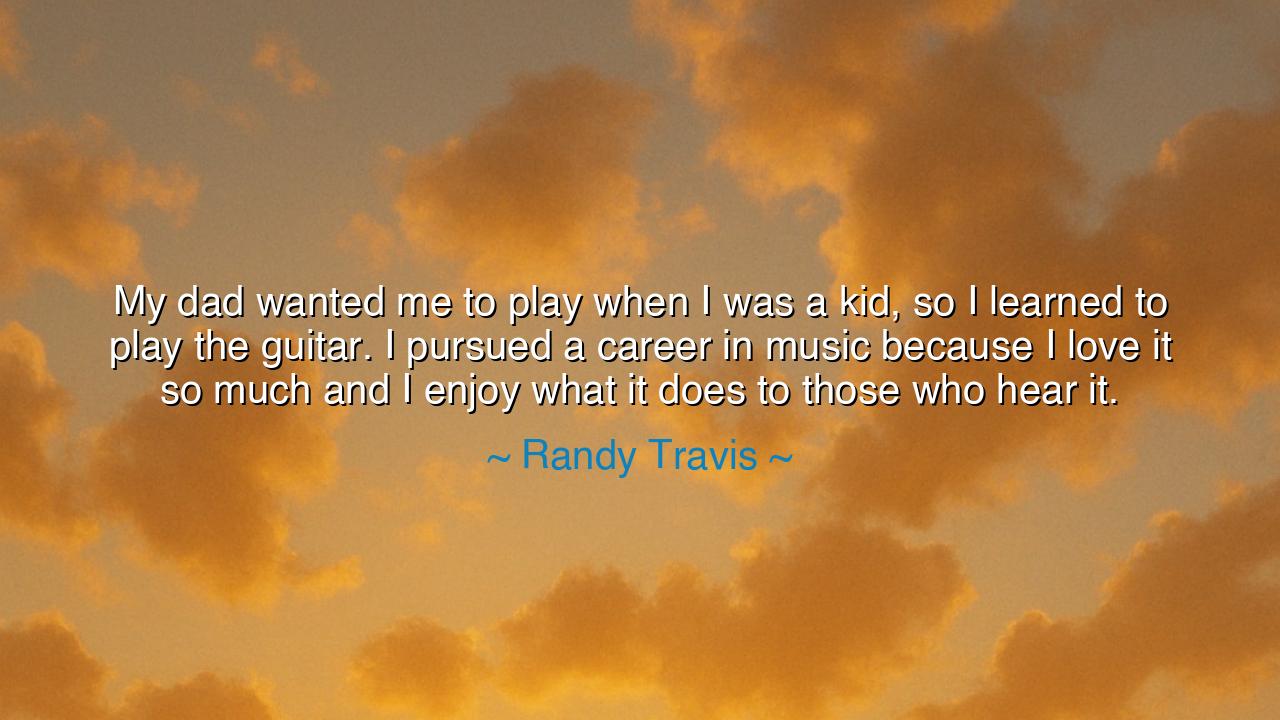
My dad wanted me to play when I was a kid, so I learned to play
My dad wanted me to play when I was a kid, so I learned to play the guitar. I pursued a career in music because I love it so much and I enjoy what it does to those who hear it.






“My dad wanted me to play when I was a kid, so I learned to play the guitar. I pursued a career in music because I love it so much and I enjoy what it does to those who hear it.” Thus spoke Randy Travis, the voice of deep country soul, whose songs carry both the ache of the earth and the quiet joy of the human heart. His words, humble and sincere, speak of heritage, passion, and the sacred duty of sharing one’s gift with others. They remind us that what begins as a parent’s wish can become a life’s calling, and that the power of music—or any art—lies not in fame or mastery, but in its ability to touch the hearts of others.
In the story of this quote, we glimpse the bond between father and son, the passing of a dream from one generation to another. The father plants the seed—“play the guitar”—and the son waters it with devotion until it blooms into purpose. This is an ancient pattern: the elder shaping the path of the young, not by command but by inspiration. Randy’s father did not merely hand him an instrument; he handed him a way of seeing the world. The strings of that guitar became strings of destiny, tying the lessons of the past to the songs of the future. Such beginnings are sacred, for they remind us that talent is a gift, but purpose is a legacy.
And so, Randy Travis learned to play, not just as an act of obedience, but as a discovery of self. The guitar became his companion, his teacher, his prayer. In those notes he found the echo of his own soul and the reflection of others’ hearts. To love something “so much,” as he says, is not a casual affection—it is a fire that transforms effort into art. True musicians, like true poets and craftsmen, do not simply perform; they commune with what they love. Each melody is a confession of joy, pain, and gratitude. The act of creation becomes not labor, but worship—a dialogue between human spirit and divine rhythm.
There is an old story of King David, who, before he was king, was a shepherd boy with a harp. When he played, even the troubled soul of King Saul found rest. Music flowed from David not as entertainment, but as healing. So too with Randy Travis: he did not play merely for applause but for what it does to those who hear it—how it softens sorrow, revives memory, and stirs the soul toward peace. The true artist is not a performer but a servant of emotion, one who carries beauty from the unseen into the world of sound. His reward is not the crowd’s cheer but the single tear that falls unseen from a listener’s eye.
The origin of Randy Travis’s path was not grand or glorious; it was simple, rooted in the humble soil of rural life. Yet greatness often begins in simplicity. A boy with a guitar in his hands, sitting under the open sky, learns more about truth and humanity than one who studies it in books. He learns the rhythm of rain on the roof, the song of the wind through the trees, the music of laughter and loss. Out of these small things, he builds a cathedral of sound that welcomes all who listen. And that is why his words carry such power—they are not about fame, but about love and connection, the two eternal threads that bind artist to audience.
The lesson, then, is this: when you discover what you love, pursue it with reverence. Let it become not only your joy but your offering. Whether you play an instrument, write, teach, build, or care for others, do it not for reward, but for the good it brings to those around you. The purpose of your gift is not to elevate you, but to lift others. Every act of true love—be it song, word, or deed—has the power to change the unseen world within another person. And that, my child, is the truest form of art.
So, remember this truth that Randy Travis teaches: the seed of greatness is often planted by those who love us, but its fruit ripens when we use it to serve. When you do what you love with sincerity, you join the eternal choir of creation itself—each note, each word, each act resonating with the music of life. Play your song, whatever it may be, not to be heard, but to be felt. And when you see joy or healing in the faces of others because of what you’ve shared, know then that you, too, have said “yes” to the sacred rhythm of existence.






AAdministratorAdministrator
Welcome, honored guests. Please leave a comment, we will respond soon